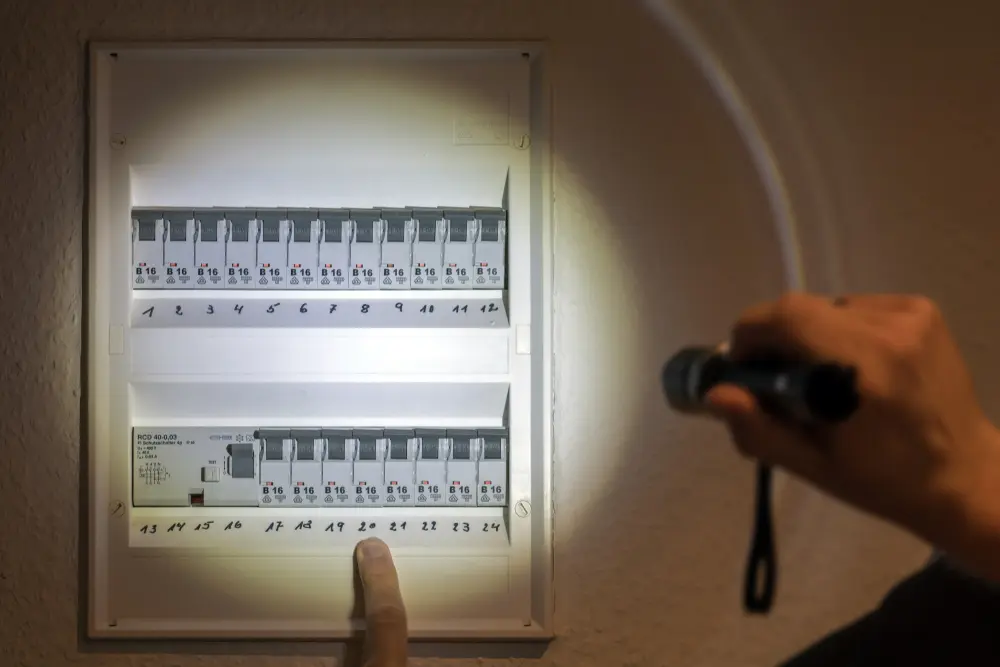11 Possible Causes of a Blown Fuse and What to Do Next

A blown fuse might seem like a minor hassle, but it’s often your home’s way of telling you something’s off with the electrical system. Maybe the lights flicker when you turn on the microwave, or you’ve noticed a strange burning smell near an outlet. Whatever the case, it’s worth paying attention to.
The expert electricians at LimRic can help guide you through how to spot a blown fuse, why it happens, what you can do, and when it’s time to get professional help.
Understanding Blown Fuses and What They Look Like
What is a Blown Fuse?
A blown fuse happens when too much electrical current passes through a circuit. To prevent overheating or a fire, the fuse “blows” by melting its internal filament, which interrupts the flow of electricity. This safety measure protects your home’s wiring and devices from damage.
What Does a Blown Fuse Look Like?
Blown fuses are usually housed in cylindrical or cartridge-shaped containers within a fuse box. The common signs of this issue include a broken or melted filament, blackened or burnt marks inside the glass, and scorch marks or discoloration on the metal ends.
How to Tell if a Fuse is Blown
You have a blown fuse on your hands when you start noticing:
- Loss of power in part of your home
- Appliances that suddenly shut off
- A burning smell near outlets
- No continuity when tested with a multimeter
One common mistake is thinking a blown fuse is a simple breaker trip. If your home uses both of these, inspect the fuse panel and circuit breakers when troubleshooting.

What Causes a Fuse to Blow?
1. Overloaded Circuits
Plugging in too many devices on one circuit can cause it to exceed its electrical capacity, resulting in a blown fuse. This often occurs in kitchens, bathrooms, or entertainment areas where multiple high-powered devices are simultaneously turned on and running.
To avoid this, distribute your appliances across multiple circuits, or unplugging unused devices can prevent overload.
2. Short Circuits
A short circuit occurs when a hot wire touches a neutral or ground wire, creating a surge of current that instantly blows the fuse. These can result from loose connections, damaged wiring, or internal appliance faults.
If this happens, the affected circuit should be shut off and professionally inspected to prevent fire hazards.
3. Ground Faults
Ground faults happen when electricity escapes its intended path and flows directly into the ground, often through moisture or exposed wires. This sudden current change can trip breakers or blow fuses.
These problems can be avoided by checking for any moisture or damaged outlets in the vicinity of the fuse location. Additionally, installing ground fault circuit interrupters (GFCIs) can help reduce the risk in areas prone to moisture.
4. Arc Faults
Arc faults are caused by intermittent contact between wires or connectors, producing heat-generating sparks. These often stem from deteriorating insulation or damaged cords.
Updating your wiring and installing arc-fault circuit interrupters (AFCIs) can help reduce fire risk and maintain electrical safety.
5. Circuit Breaker Issues
Sometimes the problem lies with a malfunctioning circuit breaker rather than the fuse itself. If a breaker fails to trip as it should or keeps resetting, it may also cause frequent fuse issues.
A professional should inspect the electrical panel to ensure all components are functioning correctly.
6. Faulty Wiring
Outdated, frayed, or improperly installed wires can disrupt electrical flow, increasing the risk of blown fuses. Homes with aging infrastructure are especially vulnerable.
Having a licensed electrician perform wiring or rewiring ensures your system meets current safety standards.
7. Outdated Electrical Outlets
Older outlets, especially two-prong versions without grounding, may not handle today’s higher power demands. When overloaded, these outdated systems can cause fuses to blow more frequently.
Upgrading to modern, grounded outlets improves safety and efficiency.
8. Incorrect Fuse Types
Using a fuse with a higher amperage than the circuit requires allows more current to pass than it can safely handle. This can overheat wires and lead to fires.
Always use the correct amperage and type of fuse to protect your circuit properly.
9. Moisture
Water from leaks, humidity, or outdoor exposure can seep into outlets or fuse boxes, disrupting electrical flow and leading to shorts or corrosion.
Keeping electrical components dry and sealed, especially in basements, bathrooms, and outdoor areas, is essential.
10. Power Surges
High-voltage spikes from lightning or grid switching can overwhelm a fuse’s capacity. Homes without surge protection are particularly at risk.
Installing a whole-home surge protector can help prevent future damage.
11. Electrical Capacity Needs Upgrading
If your home frequently blows fuses after installing new appliances or finishing renovations, your electrical system may no longer meet your household’s needs.
Upgrading your electrical panel ensures that your system can safely support modern energy usage.

When to Get an Electrical Inspection After a Blown Fuse
A blown fuse once in a while is nothing to start panicking about. But if blown fuses start becoming routine—especially across different rooms or appliances—it’s your home’s warning sign of a deeper electrical issue.
You should consider a full inspection if:
- Fuses blow multiple times in a week
- Persistent burning smell or sparking
- Your home is over 30 years old
- You’ve recently added high-powered appliances
A licensed professional can check your electrical panels, look for any faulty wiring, and identify potential fire hazards.
Looking for a list of warning signs to look for? The City of Charleston’s official guidelines break down the common signs of electrical danger to look for if you are on the fence about calling in an electrician.
Stay Ahead of Electrical Hazards with Preventive Care
While blown fuses interrupting your latest binge watch can be a headache, they are often a sign of a much more severe electrical problem that shouldn’t be ignored. LimRic’s expert electrical maintenance and repairs can help you avoid dangerous faults and costly repairs.
Our thorough electrical inspections identify and address problem areas, such as worn wiring, improper grounding, or capacity issues, before they become serious hazards. We also inspect your electrical panel and provide any needed adjustments and upgrades to match your power usage.
Tired of blown fuses cutting into your day? Let the expert electricians at LimRic take it from here. Contact us today or visit our website to schedule your preventive inspection and maintenance.
Frequently Asked Questions About Blown Fuses
Is a blown fuse dangerous?
Yes, a blown fuse can indicate a potentially dangerous electrical issue, such as overheating, a short circuit, or damaged wiring. If you have a persistent fuse issue, it’s essential to have a licensed electrician evaluate the problem to prevent fire risks or appliance damage.
What should I do if my fuse keeps blowing?
If a fuse keeps blowing in the same circuit, unplug all devices from the affected outlets and inspect them for signs of damage, such as scorch marks or melted plugs. Then, call a professional for further troubleshooting.
How do I reset a blown fuse?
To reset a blown fuse, turn off the main power, identify the blown fuse (look for a broken filament cartridge or darkened glass tube), and swap it out with a brand new fuse with the same amperage. If you’re feeling uncomfortable in handling the reset, call a certified electrician, and they will provide a thorough reset.












